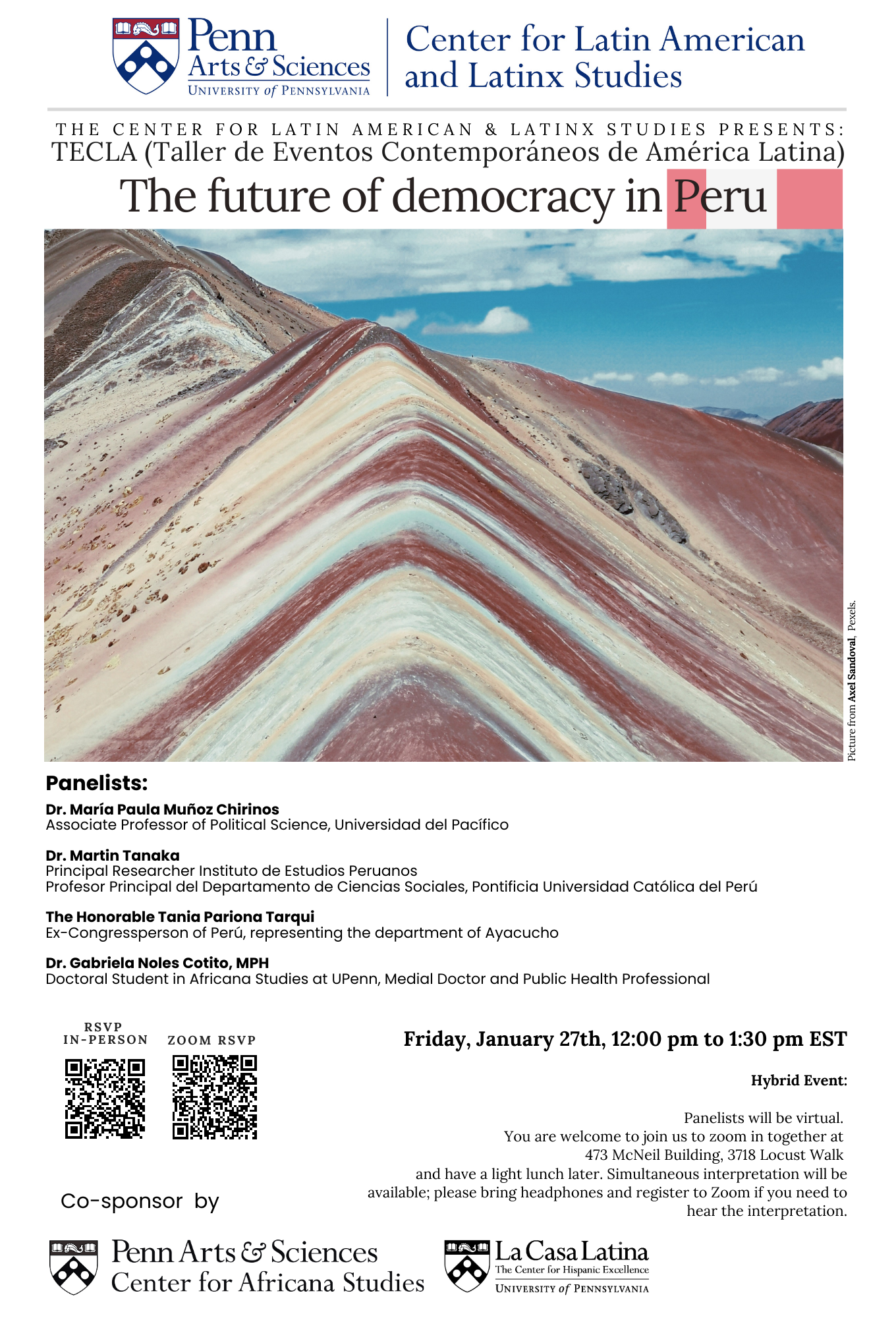TECLA
Location: 473 McNeil Building, 3718 Locust Walk
If you want to join physically, but don't understand Spanish, please bring a device to join the simultaneous interpretation via Zoom (phone, laptop or tablet plus headphones). If this is the case, we highly recomended you also register via zoom before the time of the event.
For both in-situ and remote simultaneous translation, please review these instructions.

What is happening in Peru? What was behind the perceived attempted autogolpe by President Castillo this past December? How can we better understand the current nationwide protests? Is Peru’s democracy in peril or are these symptoms of an activated popular will by diverse sectors of society? Organized and moderated by Lucía Stavig, a Penn-Mellon Just Futures postdoctoral fellow, the TECLA will feature these renowned panelists:
Dr. María Paula Muñoz Chirinos
Associate professor in the Department of Social and Political Sciences of the Universidad del Pacífico and CIUP researcher. She holds a Ph.D. and Ma. in Political Science (Government) from the University of Texas at Austin (United States), and a Bachelor of Social Sciences with a minor in Sociology from the Pontifical Catholic University of Peru. She is the author of the book Buying Audiences: Clientelism and Electoral Campaigns When Parties are Weak (Cambridge University Press, 2019). She has published in journals such as Comparative Politics, Revista de Ciencia Política, Journal of Democracy, Journal of Politics in Latin America. Between January and March 2019, she was a Member of the Advisory Commission "High-Level Commission for Political Reform", formed to propose the norms for the implementation of the political reform in Peru. She is a member of Grupo Sofía, a network of women researchers in the social sciences in Peru, and of the #NoSinMujeres Network of Political Scientists.
Dr. Martin Tanaka
Dr. Tanaka received his PhD in Political Science from the Latin American Faculty of Social Sciences (FLACSO) in Mexico. He is a principal investigator at the Institute of Peruvian Studies, of which he was General Director from 2005 to 2007. He is also a professor in the Department of Social Sciences at the Pontificia Universidad Católica del Perú. He is currently Director of the School of Government and Public Policy and Director of the Doctorate in Political Science and Government at La Católica. He was a Postdoctoral Visiting Fellow at the Helen Kellogg Institute for International Studies at the University of Notre Dame, Indiana (2003 and 2009). His research topics include democracy, State, politics and parties; social movements, citizen participation and conflicts; Political culture and history of political thought in Peru and Latin America. Has books and book chapters published by the Institute of Peruvian Studies, Cambridge University Press, Stanford University Press, Johns Hopkins University Press, Brookings Institution Press, Lynne Rienner Publishers, Routledge, PRAEGER, Pablo Iglesias Foundation, UNAM Institute of Social Studies, and the University of London, among others. He is also a weekly columnist for the newspaper El Comercio.
The Honorable Tania Pariona Tarqui
Quechua leader, social worker, politician and human rights activist who represented the Department of Ayacucho in the Congress of the Republic of Peru. As an activist, she works largely to establish social equality for the Indigenous, youth and women. In 2016, she was elected to the Peruvian Congress by the Broad Front for Justice, Life and Freedom. In September of 2017, she joined the New Peru blog. On 15 August 2018, she became president of the Women and Family Commission of the Congress.Tania grew up in times convulsed by the terrorism of Shining Path in the city of Huamanga, but in her childhood she often went to her hometown of Cayara to help her grandparents. When she was four years old, soldiers of the Peruvian army killed 39 people in Cayara, after Shining Path killed four soldiers.Tania studied Social Work at the San Cristóbal of Huamanga University, graduating in 2009, and then Human Development at the Pontifical Catholic University of Peru in Lima. In her parliamentary work she has dedicated herself to the defense of the rights of indigenous and native peoples against mining companies, claiming the right to prior consultation, the human right to water and reparations for the victims of the armed conflict, also against impunity of the perpetrators of crimes at that time, including compulsory sterilization under Alberto Fujimori's government.
Dr. Gabriela Noles Cotito, MPH
Gabriela I. Noles Cotito is a Ph.D. student and Benjamin Franklin Fellow of Africana Studies at the University of Pennsylvania. She received her Doctor of Medicine from the Universidad Peruana Cayetano Heredia and her Master’s in Public Health from the Harvard T.H. Chan School of Public Health. She is from Lima, Peru, and prior to starting her studies at Penn, she worked as an expert consultant in ethnicity and health focusing on Afro-Latin Americans at the Pan-American Health Organization (PAHO/WHO) where she drafted health strategies for Afro-Latin Americans and Afro-Latin American youth. She also designed and supported health initiatives for Afro-Peruvians for the Peruvian Ministry of Culture and Ministry of Health. Additionally, she is a social entrepreneur working in women’s empowerment and sexual and reproductive health with adolescents in a historically black rural community in Peru where she holds a pro bono medical practice. Her research interests include the health status of Afro-Latin Americans, race and ethnicity as a barrier to health access for the Afro-Diasporic population in indigenous countries and intercultural health policies in this context.

 Center for Latin American and Latinx Studies
Center for Latin American and Latinx Studies